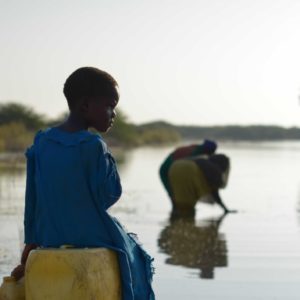The Stream, September 4: India Plans to Implement $87 Billion River-Joining Project
The Global Rundown
An $87 billion plan to connect several of India’s largest rivers could lessen the impact of floods and droughts in the country. Hurricane Harvey flooding causes thousands of tons of pollutants to leak from chemical plants in Houston, Texas. Warming temperatures and land-use changes in upstream Syria could lead to longer, more frequent droughts in Jordan. The city of Pittsburgh, Pennsylvania struggles to remove lead from its drinking water. Students from Taiwan create popsicles out of river water to showcase the country’s pollution.
“We hope when more people see this they can change their lifestyles.” –Hung Yi-Chen, a student from the National Taiwan University of Arts, who worked alongside two other students to create a project entitled “Polluted Water Popsicles.” The students collected water samples from 100 different lakes, rivers, and beaches in Taiwan, then froze the samples in a popsicle shape and coated them in resin. The resulting ice blocks were a wide range of murky colors and contained various debris, including plastic. The Guardian
By The Numbers
60 Number of rivers in India that could potentially be connected as a result of an $87 billion river-joining plan. Indian Prime Minister Narendra Modi believes that the formidable project will end deadly floods and drought in the country. The project is set to begin next month. Reuters
In context: India’s severe drought causing havoc
2,700 Tons of extra pollution that have contaminated the air around Houston, Texas. Flooding from Hurricane Harvey caused leaks from refineries and chemical plants, pushing the Houston ozone level three times higher than the national standard. Water contamination from the excess pollution is also possible. The Guardian
Science, Studies, And Reports
A recent Stanford University study found that, if current conditions persist, rainfall in Jordan will decrease by 30 percent and temperatures will increase by 6 degrees Celsius by the end of the century. Changes in water use by upstream Syria could also limit the country’s water supply. Researchers advised that changes in Jordan’s environmental policy and water-sharing agreements are needed to avert longer, more severe droughts. Science Daily
On The Radar
In certain areas of Pittsburgh, Pennsylvania, drinking water is highly contaminated with lead. The city is attempting to fix the problem, but only has the authority to replace public service lines, meaning countless private lines remain contaminated. Currently, the city is pushing a state bill that would allow it to replace all polluted lines in the city, a $400 million, decade-long project. NPR
Kayla Ritter is a recent graduate of Michigan State University, where she studied International Relations and Teaching English to Speakers of Other Languages. She is currently based in Manton, Michigan. Kayla enjoys running, writing, and traveling. Contact Kayla Ritter




